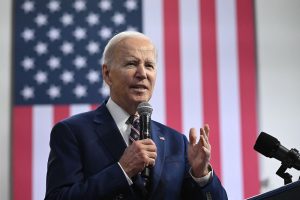
Mendez: Price caps on inhalers won’t do enough
President Biden recently held an event to celebrate that three major drugmakers announced they are putting a $35 monthly out-of-pocket price cap on asthma inhalers. This means people with asthma will pay at most $35 monthly for inhalers made by Boehringer Ingelheim, AstraZeneca and GSK.
Great news for asthma patients? Yes and no.
The price caps on inhalers are a win for people with asthma. These price caps will provide real financial relief and, it is hoped, more access to the medications people need. Asthma affects 27 million Americans, including 5 million children. Americans die of asthma daily. Research from the Asthma and Allergy Foundation of America shows that people with asthma will not take their medications if they cannot afford them.
While it’s nice to see drug companies making medicines more affordable through price caps, here is the bad news: When drug companies lower prices, people with asthma may have to pay more for their drugs.
For example, GSK introduced a clinically identical but cheaper generic version of its popular Flovent inhaler last year. But people with asthma who were longtime users of Flovent were forced to take a different medication because CVS Caremark, one of the three largest Pharmacy Benefit Managers, did not cover this cheaper generic version.
When PBMs refuse to cover the cheaper generic, patients are left on the hook for the full cost. Insurers and employers hire PBMs to manage prescription drug benefits. The PBMs are supposed to negotiate lower drug prices and control costs for insurers and employers. However, in practice, the incentives in the system encourage the opposite.
PBMs earn income through discounts given to the PBM by the drug company in the form of rebates. PBMs pocket a part of these rebates as compensation, and employers pocket what’s left to lower employer healthcare expenses. Rebates are calculated as a percentage of the list price, so PBMs are incentivized to select the costliest medicines for coverage, even if that means patients pay more than they need to.
It’s time for lawmakers to fix the backward incentives in the drug pricing ecosystem. The most direct solution would be to decouple PBM compensation from the list price and remove the financial incentive to keep list prices high.
Congress has started down the path to reform. Last year, the Senate Finance Committee advanced a bipartisan bill that delinks PBMs’ compensation from the list price of drugs. This would be an essential step toward a more rational drug-payment system. In the House, the Protecting Patients from PBM Abuses Act would prohibit reimbursement based on list price.
But federal action alone won’t be enough. Employers hiring PBMs to manage their drug benefits must demand contracts that prioritize making drugs affordable. Doctors must be empowered to prescribe the lowest-cost, effective drugs. And the patients need tools that allow them to see the actual prices of their drug options — and challenge unaffordable charges.
Kenneth Mendez is the president and CEO of the Asthma and Allergy Foundation of America/InsideSources.com.


